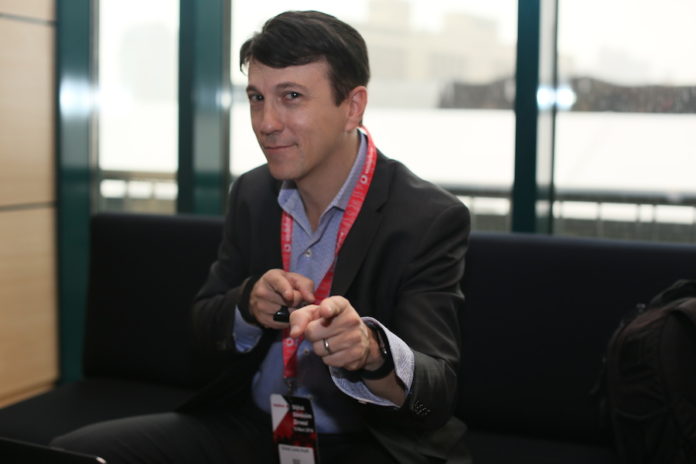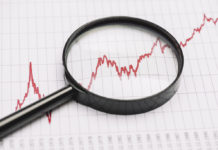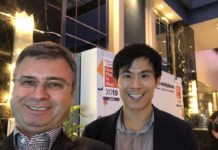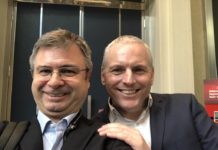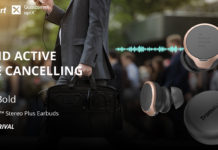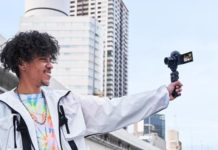I had a chance to have a fabulous interview with Daniel Kraft, M.D. Faculty Chair, Medicine from Singularity University when he visits Istanbul.
Hi. You concentrate on the health sector, and it is going to be the area of health in the future. Can you give us some ideas? What will be the innovations in the health sector?
Future healthcare isn’t any one technology, and it’s not anyone problem. So I think we need to think about the way the world works regarding healthcare as much more sick care in most parts of the world. The data that we get is very intermittent: An occasional blood pressure, EKG or lab test that you may never see and that your doctor may never see until weeks later. We are therefore very reactive. We wait for the heart attack, for the stroke, or the lump to be discovered, at a late stage of cancer for example. And I will argue that old technology and new technology is coming together converging. We have the opportunity to reinvent and re-imagine elements of health and medicine be much more continuous with our data, and much more proactive, meaning we are trying to prevent the diseases instead of waiting for them to occur. That’s going to be a blend of connected mobile digital health, epitomized by what you could do with high-speed networks and your smartphone. It’s going to be the integration of big data because now we have lots of data that can come from wearable devices or our genetics. The challenge is how to bring that all together and make it.
We have wearable gadgets.
Right, and they all do the same thing: They’ll track your steps and your sleep. They now give you as an individual the ability to be a bit empowered. You have some insight on how much activity you’re doing or how well you’re sleeping. Today that data doesn’t usually go back to your doctor but soon, in the next few years, I’ll be able to prescribe you wearable gadgets or something. Or a blood pressure cuff or a glucometer that track your blood sugar, or your scale and that data will come back to your medical team. It will help manage prevention and diagnosis and therapy. And as technologies get cheaper and more available, you can now have on your wrist like my smartwatch tracks my heart rate and my motion that reminds me to stand up if I’m sitting too long, cause sitting is the new smoking…
How many gadgets do you have?
I have a few on me today, you know…
I mean in your daily life.
Sometimes I keep it simple, just a couple. But even on my phone, I have an EKG sensor, which can track my EKG. That’s an example of something already on the market for a couple of years. And you hold the EKG case, and you can record your live EKG’s and send that anywhere in the world.
Do you have a biohacker T-shirt?
Well, I also got. But this isn’t biohacking; this is just measuring. Biohacking would be when I take that data, and I boost my heart in some way. In my shirt here, there is a little band-aid that can talk to my smartphone in real-time. Right now, it’s tracking my real-time data. So you can see my heart rate, you can see my EKG coming through that smart patch, and it can report all sorts of information and send it anywhere in the world. So you could be logged in from Istanbul to San Francisco, see my posture, my position, all sorts of data, again, through a bluntly low-cost patch that could be used in a hospital or home.
I am very interested in that gadget. What is it?
It’s a little band-aid, essentially, that I am wearing right here, that’s transmitting my vital signs through my phone to the cloud.
Is it available on the market?
It’s just starting to come to market. Companies like Philips are starting to put these in hospital settings. And, this is an example of a lot of data. What do we do with that? No one wants to be watching her data 24/7. How do we add the filters and the analytics on top, and make sense of all the different feeds of information as they come together?
So, what do you think about biohacking? I believe there are different types of biohacking. The biohacking that I’m talking about is gathering the data, analyzing it and changing your lifestyle.
That’s often called “Quantified Self.” It can track your steps, your sleep, your typing, your mood.
I would argue we’re going from this ‘Quantified Self’ to this “Quantified Health,” where we can use is not just to gather the data, but use to understand it, sometimes crowdsource it and use that to change the behavior of either yourself or many people. It can be used for hacking practice as well. Some people need different kinds of user interface. The techno-geek, the biohacker could look at the raw data like all the data, but with a little grandma just wants to see a little, like an empty or full tank or red, yellow or green light. How do we simplify the information, kind of like the check engine light in your car so that it can become useful to you and not overwhelming? Most people don’t want to log into ten different apps and data streams. We need to integrate it, again, like your car or as a GPS for your healthcare to guide you on your health journey or on if you have a particular disease like diabetes or heart disease help guide your therapy and in real-time. And so, hacking in a sense comes from many people start to apply this thinking of new ways. I might be using your genetic information, your quantified self-data, sometimes even people planting things in their bodies. Sometimes that innovation comes outside of the traditional medical establishment. There’s a balance there.
How far do you use this technology? Do you only gather the data, or you analyze it and send and get some artificial intelligence programs analyzes and?
Well, we’re starting to see. Even with Apple health kit; it begins to integrate the data, might give you trends. There’re apps; one called LARK, L-A-R-K, that looks at your data and provides you with a bit of a conversation and says “How are you doing? You probably have been traveling.”
And, that’s an example of, again, making sense of this over time, because no one wants to log into all sorts of different wearables and apps and data. It looks that I’ve been active. It knows I’ve been active. It will track my sleep. It says I’ve hit the road. It might give me some suggestions about jet lag management.
So I don’t use any one thing, I might try many of them. Some of them can track my exercise smartly, and I can post them up and brag. Others can help with my sleep, especially when I’m on travel. So I think it’s an interesting time for all of us not to think one-size-fits-all, just like I’m not going to provide you the same pills. I might provide to him/her a different kind of wearable device then you, one might look nicer as jewelry, he/she might want one that fits in his wallet as an example.
What do you think about the insurance companies? Will those gadgets be mandatory in the future for us to track our data? Today it is voluntary, but is it getting there?
It’s a bit of a slippery slope. When your insurance company will say ‘I’m going to give you a lower price if you show that you’ve gone to the gym, you’ve quit smoking, you’ve done 8000 steps a day’, should you pay less than the person who is not exercising, not taking their medicines, not taking care of themselves? Maybe. And we already see some systems play that out. But, when we are in here now, digital exhaust, which can always be measured. Issues of privacy, issues of ethics. So there is no exact answer, I think. If you have the opportunity to opt-in, and you want to be able to share your health data and maybe benefit from the ability to get some value from that, that should be okay as well.
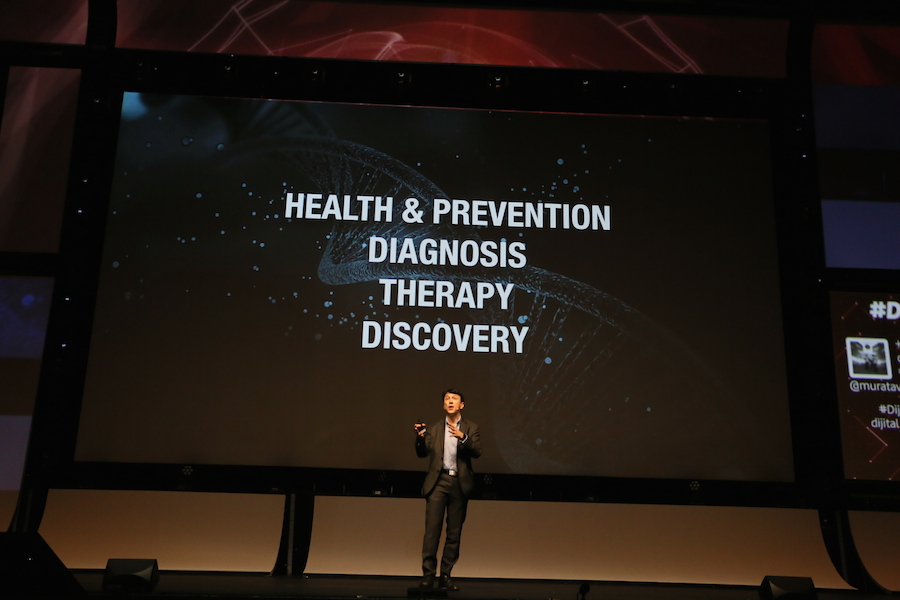
Can you talk about the hacking DNA, gene therapy, cloning?
We are in this exponential age, not just with digital data but even in genomics.
I run a conference called “Exponential Medicine” in October 2016. Exponential Medicine is the website. We bring together all sorts of folks from geneticists from Harvard to folks who analyze big data, to folks doing 3D printing, etc.
On the genetics space, we are now primarily a thousand-dollar genome today. Soon it’ll be a hundred-dollar genome. Once we start to crowdsource thousands and millions of people and their genes, we are going to start to learn a lot more about how to do prevention, diagnosis, and therapy.
And we’re even seeing companies like “Human Longevity Inc.” start to integrate your DNA, your microbiome as well, your prodium to start giving you hopefully information that you can use if you are a doctor or the patient.
We are adding the world of gene therapy. Now it’s CRISPR not just to read DNA but to print DNA or make very site-directed ways to modify genes which could be curing diseases like sickle cell thalassemia, and maybe even HIV. So, there’s a lot of things happening, moving very quickly, sometimes faster than the regulatory reimbursement world’s allowed for. And I think, you know, for many of the kids going up today synthetic biology, the ability to program DNA may be just as important as programming computers have been for the last couple of decades.
What is the social effect of those innovations and changes do you think?
Sometimes there’re unintended consequences. If you know your genome when you’re two years old, ten years old or 40 years old and you know what risks of diseases you have. That may change how you live your life. Sometimes, if you have a high risk of Parkinson’s disease as Sergey Brin, the co-founder of Google, found out, he started funding a lot of research there and doing more exercise or things that might be preventive. Even if you’re not a billionaire, you can crowdsource research dollars for a particular disease. It may change the way that you, again, stay on top of your health, when you can own your genetic information. Or share your digital information. We can speed up the way we do clinical trials. You can take your microbiome today, and share that, and learn how does your microbiome affect everything from obesity to psychiatric disorders to autoimmune diseases. So it’s a lot of interesting time where we can all become participatory. It’s not just going to a clinical trial the old fashioned way, which most folks do. You can download a clinical trial now on research kit for Parkinson’s, for asthma, for autism. I think anybody can play a role now and improving healthcare by being a data donor as well.
We had an interview with Brad Templeton about driverless cars, weeks ago. What do you think about that?
Imagine the power of what a self-driving car can do today. All that data integrated real-time. What if we plugged that same thinking to healthcare? Self-driving healthcare is integrating all this data. What’s your roadmap, what’s the map, where’s the bad weather, what turn do you need to make? And again improving and crowdsourcing the map, so they keep making the driving better, as opposed to waiting for other people to discover the same traffic jam. So, a lot of cross-fertilization between fields from self-driving cars to drones is going to be applied to healthcare.
It depends on big data and data analytics.
Right, cause no one wants the big data. You can get overwhelmed with big data, and it needs to become actionable information you can use. So, if you have a smartphone, and you can ask the question “Doctor Siri, I have belly pain” but if it knows if you’re a woman or pregnant or have your appendix or you don’t have your appendix it is much more likely to be useful.
I think it’s getting there.
Yes. And again sifting through all the data, so it’s not too much it becomes useful is a big challenge and a big opportunity.
Is there anything that you would like to add?
I’ll close by saying that I have a lucky role as a doctor sharing the medicine side of Singularity University. www.singularity.org has a lot of information about different programs, and www.exponentialmedicine.com as well. In the future, healthcare is bringing folks of all sorts of areas together from the media, from mobile, from designers to data scientists and roboticists and people using drones. All these things can be applied in new ways to improve healthcare across the planet.
Thank you very much for your time.
Sure.
Sinan Oymaci


